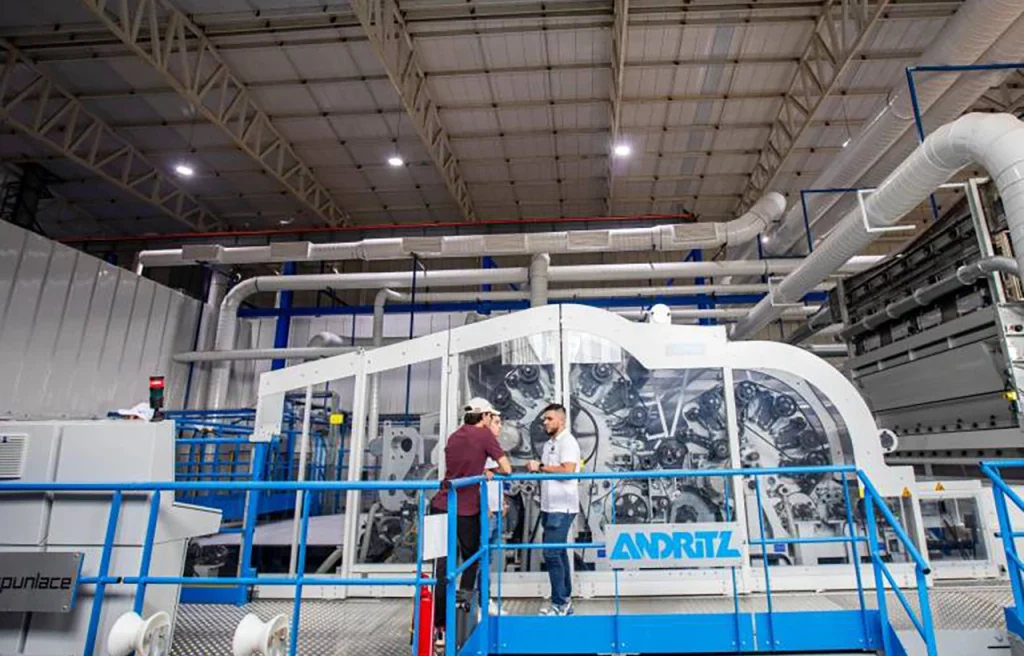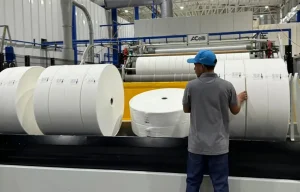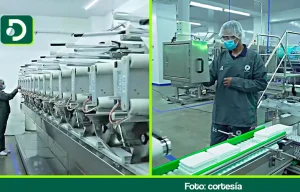Guarne-based Quimicolor inaugurated a 2,600-square-meter machine, unique on the continent.

In times of uncertainty and slow growth, stories like Quimicolor's are a balm that helps us see hope for the country's economic future. This company, based in Guarne (Antioquia), has become the only company in Latin America to produce nonwoven fabrics (Spunlace) with cutting-edge technology and the highest speed for wet wipe production.
And achievements like this are only possible thanks to crises. Daniel Mendivil, purchasing director of Quimicolor and son of its founder and president Antonio Mendivil, assures that the breaking point came with the pandemic, at that moment they realized that the dependence they had on Asia was not good for their business, and only from that side of the world could they import the fabric to make the wet wipes they manufacture. Quimicolor is the maquila of Little Angel, D1's own brand.
After the pandemic, things got worse. The world was talking about a container crisis, and international trade became more expensive than ever before: “Transporting a container cost more than the fabric inside it, and we had to transport 30 containers every month,” Daniel recalls.
And not only was there uncertainty about whether the raw material would actually arrive, and the high costs, but they were also left without cash flow, since they had to pay for the fabric when they placed the order, even if it arrived late at its destination.
So, They began to look for solutions, they saw that not only were they importing this type of fabric, but that it was a need for the Colombian industry and the rest of the region.So they embarked on a project that finally saw the light of day on Friday before industry representatives and the media: they invested in their own fabric production machinery. This decision will radically transform their business model.
So, they began looking for solutions. They realized that they weren't the only ones importing this type of fabric, but that it was a necessity for the Colombian industry and the rest of the region. So they embarked on a project that finally saw the light of day on Friday before industry representatives and the media: they invested in their own machinery for fabric production. This decision will radically transform their business model.
The Andritz machine is the best in its segment, used to manufacture spunlace fabrics using cutting-edge technology. Its size occupies a 2,600-square-meter facility and is actually composed of French, Spanish, and Italian components. The complete machine costs €7 million, and the purchase was made possible thanks to the French Bank, which provided a cheaper loan.
With this innovative machine, Quimicolor is the only one company of Latin America which can produce nonwoven fabrics, which are made from synthetic and natural fibers and are "woven" under water pressure. These fabrics are also used to make surgical gauze.
Quimicolor now has the capacity to produce more than 10,800 tons of nonwoven fabric in rolls per year, but currently only requires 3,600 tons for its own production lines, giving it ample room to serve the regional market. Or rather, it could become a supplier to those who were its competitors until Friday.
The market for it exists, Because 40,000 tons of this fabric are imported into the region from Asia, Daniel is calculating that they will soon be overwhelmed, and why not, it will be necessary to buy another machine..
The numbers are in their favor: for every container of raw material imported, the Colombian company can manufacture the equivalent of three containers of fabric, creating opportunities in the Colombian market and in the Americas to avoid imports, thus impacting freight costs by 30% and taxes by 10% on the final product.
Although the market exists, they don't yet have customers, but that hasn't stopped them from planning for the future: "We've already purchased two lots, right next to the plant, to build warehouses there to store the fabric for customers who don't exist today. Because you can't go out and sell without being prepared," Daniel notes.
And as Antonio Mendivil says: “Today, the results of this decision are evident. We have achieved complete independence from Asia when it comes to the procurement of our main raw materials. This independence has not only strengthened our supply chain but has also positioned us advantageously in the market, ensuring the quality and consistent availability of the essential fabrics for the manufacture of our wet wipes.”
For the second half of 2024, Quimicolor forecasts sales growth of 251% in 3Q compared to the previous year and a 301% increase in direct jobs, increasing both labor and automation.




